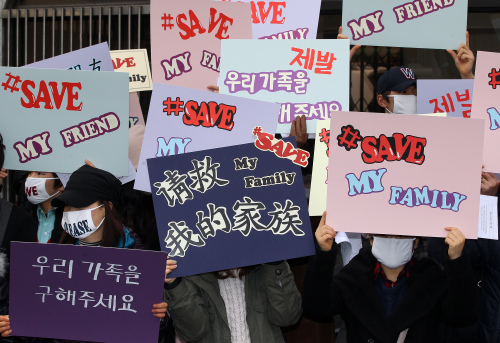South Korea plans to raise the issue of North Korean defectors who face repatriation after being caught in China, at a U.N. panel on human rights next week, its Foreign Ministry said Tuesday.

While engaging in bilateral talks with Beijing on the issue, it is also seeking international support to protect the defectors, who could allegedly face harsh punishment such as torture and execution should they be sent back to the North.
As it has recently been reported that scores of defectors face repatriation, public criticism of Beijing for “turning a deaf ear to humanitarian concerns” has been mounting here. This has, in turn, ratcheted up pressure on Seoul to do more to address the issue.
“We have a plan to raise the issue of North Korean defectors at the U.N. Human Rights Council,” said the ministry’s spokesperson Cho Byung-jae during a press briefing.
Based on the Convention Relating to the Status of Refugees and the Convention against Torture and Other Cruel, Inhuman or Degrading Treatment or Punishment, Seoul will seek backing from the council to safeguard defectors’ human rights.
It, however, has yet to decide whether to specifically mention China while raising the issue at the council.
“We plan to think more about and review the expected merits and demerits of the impact from our mentioning a particular nation during the council,” Cho said.
The human rights council will hold its 19th session next Monday in Geneva, Switzerland, for four weeks.
Reports here said that the number of the defectors facing repatriation has topped 80. The arrests in China came as North Korea has reportedly warned of the “extermination of three generations” of any family with a member caught defecting.
Seoul has mentioned the issue of North Korean defectors at the U.N. general assembly. But it has not made any explicit call for Beijing to stop repatriating them at the U.N. human rights panel.
Last Sunday, Seoul’s Foreign Ministry made an official call for China to observe international treaties on refugees. In response, China said that it “cannot accept such speech.”
Beijing has so far stuck to its bilateral repatriation pact with Pyongyang. It claims that the defectors illegally crossed the border with China “for economic reasons,” and that they thus do not fall into the category of refugees protected by international conventions.
Observers said that as China does not acknowledge their refugee status, there are restrictions on Seoul’s efforts to press the country into abiding by the U.N. convention on refugee protection.
Meanwhile, Seoul’s Foreign Ministry denied news reports that China has demanded that Seoul swap Chinese fishermen, who have been detained here for illegal fishing, for the defectors nabbed in China.
“That is not true,” a ministry official said, declining to be named.
“China has previously requested that Seoul make favorable arrangements for them, but it has never requested that we discuss the issue concerning the defectors while linking it to the illegal fishermen.”
While being cautious about the possibility that the issue could strain ties with Beijing, Seoul is striving to come up with good ways to persuade China to handle things from a humanitarian perspective.
As under the U.N. convention on refugees, it is up to China to decide whether the defectors can be categorized as asylum seekers, South Korea appears to be stressing the international principle against forcible repatriation rather than highlighting their refugee status.
Some experts and activists say that China, rising as part of the “G-2” with the U.S., should present a positive image as a global leader and promote universal values such as human rights.
But Beijing is seemingly more concerned with state sovereignty than individual human rights, as witnessed on Feb. 4 when it, along with Russia, vetoed a U.N. Security Council resolution calling for the leader of Syria to step down over the bloody crackdown on pro-democracy protesters.
By Song Sang-ho (sshluck@heraldcorp.com)
-
Articles by Korea Herald




![[Herald Interview] 'Amid aging population, Korea to invite more young professionals from overseas'](http://res.heraldm.com/phpwas/restmb_idxmake.php?idx=644&simg=/content/image/2024/04/24/20240424050844_0.jpg&u=20240424200058)












![[KH Explains] Korean shipbuilding stocks rally: Real growth or bubble?](http://res.heraldm.com/phpwas/restmb_idxmake.php?idx=652&simg=/content/image/2024/04/25/20240425050656_0.jpg&u=)

